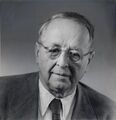Template:Selected anniversaries/November 9: Difference between revisions
No edit summary |
No edit summary |
||
| (One intermediate revision by the same user not shown) | |||
| Line 61: | Line 61: | ||
||2006: Markus Wolf dies ... German intelligence officer ... head of the Main Directorate for Reconnaissance (Hauptverwaltung Aufklärung), the foreign intelligence division of East Germany's Ministry for State Security (Ministerium für Staatssicherheit, abbreviated MfS, commonly known as the Stasi). He was the Stasi's number two for 34 years, which spanned most of the Cold War. He is often regarded as one of the most well known spymasters during the Cold War. In the west he was known as "the man without a face" due to his elusiveness. Pic. | ||2006: Markus Wolf dies ... German intelligence officer ... head of the Main Directorate for Reconnaissance (Hauptverwaltung Aufklärung), the foreign intelligence division of East Germany's Ministry for State Security (Ministerium für Staatssicherheit, abbreviated MfS, commonly known as the Stasi). He was the Stasi's number two for 34 years, which spanned most of the Cold War. He is often regarded as one of the most well known spymasters during the Cold War. In the west he was known as "the man without a face" due to his elusiveness. Pic. | ||
||2007: The German Bundestag passes the controversial data retention bill mandating storage of citizens' telecommunications traffic data for six months without probable cause. | ||2007: The German Bundestag passes the controversial data retention bill mandating storage of citizens' telecommunications traffic data for six months without probable cause. | ||
| Line 74: | Line 72: | ||
||2013: Émile Zuckerkandl dies ... biologist considered one of the founders of the field of molecular evolution. He is best known for introducing, with Linus Pauling, the concept of the "molecular clock", which enabled the neutral theory of molecular evolution. Pic. | ||2013: Émile Zuckerkandl dies ... biologist considered one of the founders of the field of molecular evolution. He is best known for introducing, with Linus Pauling, the concept of the "molecular clock", which enabled the neutral theory of molecular evolution. Pic. | ||
</gallery> | </gallery> | ||
Latest revision as of 15:20, 7 February 2022
1885: Mathematician, physicist, and philosopher Hermann Weyl born. He will be one of the most influential mathematicians of the twentieth century: his research will have major significance for theoretical physics as well as purely mathematical disciplines including number theory.
1920: Materials engineer and academic Philip G. Hodge born. He will study the mechanics of elastic and plastic behavior of materials, contributing to plasticity theory including developments in the method of characteristics, limit-analysis, piecewise linear isotropic plasticity, and nonlinear programming applications.
1922: Mathematician, philosopher, and academic Imre Lakatos born. He will be known for his thesis of the fallibility of mathematics and its 'methodology of proofs and refutations' in its pre-axiomatic stages of development.
2005: The Venus Express mission of the European Space Agency is launched from the Baikonur Cosmodrome in Kazakhstan.



